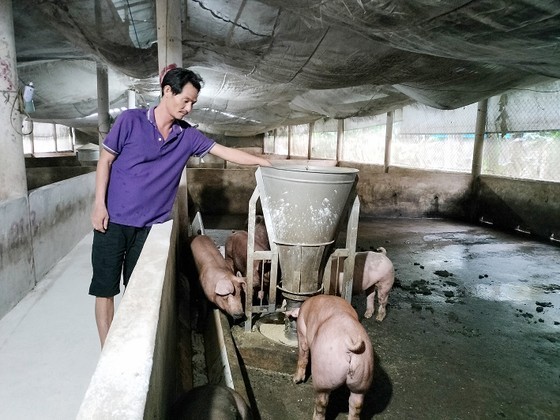 Local governments should support farmers with small-scale farms
Local governments should support farmers with small-scale farms
Sows and meat pigs are being raised on the farm of Mr. Vu Van Vinh in the Southern Province of Dong Nai’s Song Trau commune in Trang Bom District. Since the beginning of 2022, the price of animal feed has continuously increased, making farmer Vinh so worried.
According to him, at the beginning of the year, the price of pigs dropped to VND45,000 a kg, but it is currently fluctuating at VND57,000-VND60,000 a kg, while pig feed costs VND350,000 a bag. It will take roughly 5 to 6 months to raise a pig from birth to finished weight. The cost of animal feed for a pig is VND5.2 million not to mention the labor cost but it is sold at VND5.7 million - VND6 million each, said farmer Vinh.
Similarly, breeder Nguyen Van Long in the Southern Province of Ba Ria - Vung Tau’s Chau Duc District, did not dare to increase the herd of Tet pigs like in prior years. He is breeding some 50 pigs whereas he raised more than 200 pigs in previous years. As per his preliminary calculation, the cost of pig feed to slaughter increased by VND1.2 million-VND1.6 million an animal compared to the same period last year.
He moaned with the current live pig price and high livestock costs, farmers inevitably suffer losses. Accordingly, pig farmers hesitated about re-herding.
Owners of commercial centers, supermarkets, markets, and chain of convenience stores in Dong Nai Province’s Bien Hoa City are currently planning to concentrate resources to reduce production and business costs in order to reduce production costs and selling prices of products with the aim to stabilize the pork market.
However, the price of a hog is on a downward trend. A pig shop assistant named Khanh in Bien Hoa market said that the price of pork only increased slightly and then dropped whereas the price of animal feed increased continuously, so farmers don’t want to re-herd.
Mr. Trinh Dinh Xuan in Song Ray commune in Cam My District who used to be the owner of a pig farm with more than 20 sows and 500 meat pigs was depressed because he suffered losses. Presently, he is just raising 25 pigs for sale during the Tet holidays to offset the losses.
According to Vice Chairman of Dong Nai Breeding Association Nguyen Kim Doan, due to the high price of animal feed, breeding stock, and other costs, diseases, the cost of raising pigs is quite high.
The Department of Agriculture and Rural Development of Dong Nai Province’s latest report shows that the price of corn, soybean oil, and rice bran is on a downward trend compared to August 2022, but still 2.5 percent-11.7 percent higher than that in the same period in 2021. Small livestock farmers depend on breeding stock provided by enterprises, so they have to buy at a high price.
At the same time, farmers have not paid attention to disease prevention, breeding and management capacity, so their production costs are higher than farms, making them difficult to compete with other large farms in the market.
According to experts, small-scale pig farmers are currently facing many disadvantages compared to large domestic enterprises. In terms of capital, large groups and livestock companies have strong financial potential, especially foreign companies, so they are not under pressure on loan interest.
On the other hand, enterprises apply advanced breeding technology; thus, each sow can give birth to 28 piglets per litter meanwhile, sows in small farms only farrow 9-12 pigs. Therefore, it is necessary to have a preferential mechanism for capital sources, create a chain of husbandry linkages, and update and transfer advanced technologies to improve the productivity of pigs as ways to support breeders.
In particular, experts say that the reproductive performance in sows necessarily increases because it both reduces the cost of feed and partly helps to reduce environmental pollution in livestock production.
























